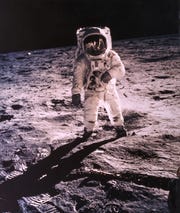To the moon: Gulf Coast Symphony, CBS veteran launch lunar landing concert
July 16, 2019
Harriet Howard Heithaus, Naples Daily News
Ease into your space suit. Pull on your gauntlets. The helmet is optional: By the magic of technology and great music, the Barbara B. Mann Performing Arts Hall in Fort Myers will be pressurized for your launch to the Moon on Saturday, July 20.
Gulf Coast Symphony is celebrating the 50th anniversary of the first U.S. lunar landing on July 20, 1969, with a program of “moon music” and footage from the historic flight. (See information box.) The narrator will be the Naples man who directed coverage for its most watched network: Joel Banow of CBS. He knows that footage and that voyage intimately.
The music is a program of what might be called intergalactic hits. There’s iconic fare such as the Richard Strauss segment, “Also Sprach Zarathustra,” identified in popular culture from “2001: A Space Odyssey.” Some of the taut soundtrack from the hit film “Apollo 13” and themes from the popular TV show, “Star Trek” are also on the program. The entire solar system takes a bow in two seat-edge segments from Gustav Holst’s “The Planets””: “Mars, Bringer of War,” and “Jupiter: The Bringer of Jollity.”

Buzz Aldrin’s footprints on the moon may eventually be filled by dust. Neil Armstrong portrait of Buzz Aldrin with the photographer and the Lunar Module reflected in his gold-plated visor, Apollo 11, July 1969 (Photo: © Bloomsbury Auctions, © Bloomsbury Auctions)
Music shakes hands with extraterrestrial life, too, through the theme from “E.T.” and “Close Encounters of the Third Kind.”
Andrew Kurtz, music director for the Gulf Coast Symphony, Lee County’s community orchestra, is fine with people who want to come dressed for the theme. In his own mind, however, it’s a patriotic concert.
Moon landing anniversary: Fifty years after Apollo, NASA is moving quickly to return to the moon. But will it work?
More: Moon myths debunked: Moon landing, ‘dark side’ and do crazy things happen during full moon?
“It’s a celebration of human achievement, but also of meeting the challenge John F. Kennedy made — to reach the moon by the end of the (1960s) decade,” he said.
“There were so many steps that had to be made to get from point A to Z. It was remarkable,” he said. On the way, the technology being developed was throwing off ideas that have become embedded in Americans’ daily lives, he continued.
A close-up view of an astronaut’s boot and bootprint in the lunar soil, during the Apollo 11 lunar surface activity. (Photo: Courtesy NASA)
Innovations such as memory foam, invisible braces, freeze-dried foods and infrared thermometers have all come from, or been perfected by, NASA research.
“Watching this growing up, it now wasn’t the same level of ‘little green men’ that previous generations had had,” he said. “What we watched over the course of the Apollo programs inspired our generations now in what might be possible.”
While Kurtz is too young to remember, Banow, who directed coverage for all the Apollo missions, was intensely focused on it. He and his crew created a wealth of interval sequences to take TV viewers all over the world on the voyage, because, as he pointed out, “in 1969, once the spacecraft was out of sight, we essentially had a radio program until they got to the moon.”
More: Moon landing: Way things were in July 1969 as Neil Armstrong, Buzz Aldrin set foot on the moon
Banow will share some of his anecdotes from how CBS handled that consuming voyage, along with the knowledge he gathered about space flight and the intricacies of the moon landing. The audience will see footage from the actual mission, following it along to the moment of astronaut Neil Armstrong’s proclamation: “One small step for man, one giant leap for mankind.”
Banow’s narrative will course through the intervals of what Kurtz said was a challenging program — not to compile, but to limit. “There are so many works that could go in there,” he said.
There has been music on the moon, in fact: Buzz Aldrin played his cassette tape of Frank Sinatra’s recording of “Fly Me to the Moon” on the lunar landing, and fellow astronaut Neil Armstrong had Les Baxter’s recording of 1947 original jazz pieces titled “Music Out of the Moon” aboard Apollo 11.
“NASA even sent recordings of music aboard some of its various space probes,” Kurtz said.
“My problem was that there’s some great music that is not really written for orchestra,” he said. It would have been costly to add a vocalist to sing the famous aria from Dvorák’s “Rusalka.” “Song to the Moon.” Or to bring in Elton John for a rendition of pop hit “Rocket Man.”
There’s even a version of space music from George Frideric Handel, “Song to Jupiter,” circa 1743, that was arranged for contemporary performance by LeRoy Anderson (“Sleigh Ride,” “Blue Tango”).
“Planets and planetary bodies are something that have fascinated men for centuries. And that includes composers,” Kurtz reflected.
See the Apollo 11 launch like you’ve never seen it before, years after astronauts Neil Armstrong and Buzz Aldrin set foot on the moon Tom Mardis and Timothy Walters, Florida Today
If you go
‘Space: The Final Frontier’
Who: Gulf Coast Symphony, Andrew Kurtz, music director, and Joel Banow, narrator
When: 7 p.m. Saturday, July 20
Where: Barbara B. Mann Performing Arts Hall, 13350 FSW Parkway, Fort Myers 33919
Tickets: $29-$49, plus $6 handling fee
To buy:gulfcoastsymphony.org
Information: 239-277-1700

